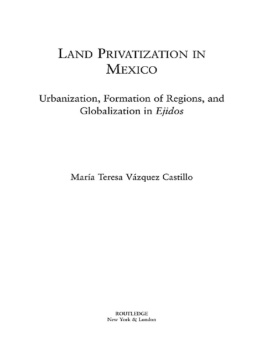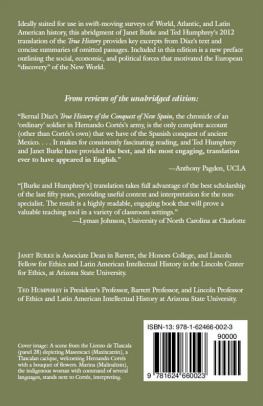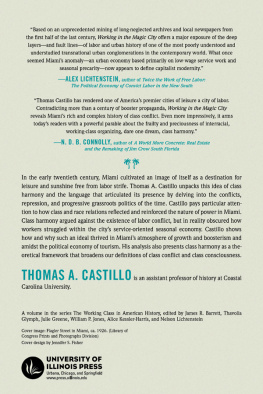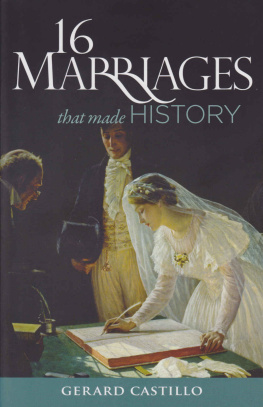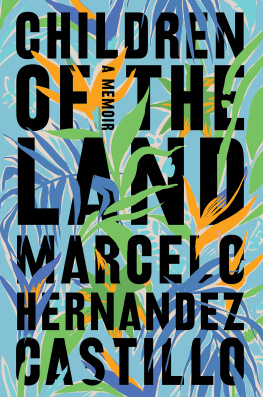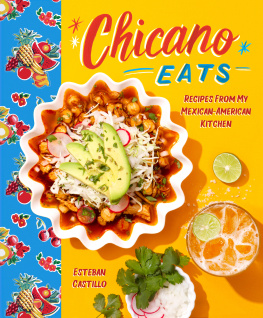Castillo-Garsow Melissa - Manteca!
Here you can read online Castillo-Garsow Melissa - Manteca! full text of the book (entire story) in english for free. Download pdf and epub, get meaning, cover and reviews about this ebook. year: 2017, publisher: Arte Publico Press, genre: Art. Description of the work, (preface) as well as reviews are available. Best literature library LitArk.com created for fans of good reading and offers a wide selection of genres:
Romance novel
Science fiction
Adventure
Detective
Science
History
Home and family
Prose
Art
Politics
Computer
Non-fiction
Religion
Business
Children
Humor
Choose a favorite category and find really read worthwhile books. Enjoy immersion in the world of imagination, feel the emotions of the characters or learn something new for yourself, make an fascinating discovery.

- Book:Manteca!
- Author:
- Publisher:Arte Publico Press
- Genre:
- Year:2017
- Rating:4 / 5
- Favourites:Add to favourites
- Your mark:
- 80
- 1
- 2
- 3
- 4
- 5
Manteca!: summary, description and annotation
We offer to read an annotation, description, summary or preface (depends on what the author of the book "Manteca!" wrote himself). If you haven't found the necessary information about the book — write in the comments, we will try to find it.
Manteca! — read online for free the complete book (whole text) full work
Below is the text of the book, divided by pages. System saving the place of the last page read, allows you to conveniently read the book "Manteca!" online for free, without having to search again every time where you left off. Put a bookmark, and you can go to the page where you finished reading at any time.
Font size:
Interval:
Bookmark:
MELISSA CASTILLO-GARSOW
 Manteca! An Anthology of Afro-Latin@ Poets is funded in part by grants from the City of Houston through the Houston Arts Alliance and the National Endowment for the Arts. We are grateful for their support. Recovering the past, creating the future Arte Pblico Press
Manteca! An Anthology of Afro-Latin@ Poets is funded in part by grants from the City of Houston through the Houston Arts Alliance and the National Endowment for the Arts. We are grateful for their support. Recovering the past, creating the future Arte Pblico PressUniversity of Houston
4902 Gulf Fwy, Bldg 19, Rm 100
Houston, Texas 77204-2004 Cover design by Shaggy Flores, Nuyorican Poeta for South of Harlem Multimedia Photo credits:
Front cover: Syldavia/ iStock / Getty Images
Back cover: Louno_M/ iStock / Getty Images Plus Names: Castillo-Garsow, Melissa, 1984- editor. Title: !Manteca!: : an anthology of Afro-Latin@ poets / edited by Melissa Castillo-Garsow. Description: Houston, TX : Arte Publico Press, 2017. | Includes bibliographical references.
Identifiers: LCCN 2017003703| ISBN 9781558858428 (alk. paper) | ISBN 9781518501241 (kindle) | ISBN 9781518501258 (pdf) Subjects: LCSH: Latin American poetryBlack authors. | BlacksLatin AmericaPoetry. Classification: LCC PQ7084 .M244 2017 | DDC 861/.708089608dc23 LC record available at https://lccn.loc.gov/2017003703  The paper used in this publication meets the requirements of the American National Standard for Information SciencesPermanence of Paper for Printed Library Materials, ANSI Z39.48-1984. Manteca! An Anthology of Afro-Latin@ Poets
The paper used in this publication meets the requirements of the American National Standard for Information SciencesPermanence of Paper for Printed Library Materials, ANSI Z39.48-1984. Manteca! An Anthology of Afro-Latin@ Poets
Copyright 2017 by Melissa Castillo-Garsow Printed in the United States of America 17 18 19 20 5 4 3 2 1
I cannot even express how much it means to be a part of such a rich poetic community. As a poet myself, many of the poets and poems in this anthology have defined my own work and my own sense of Latinidad. I lived and breathed every single one of the poems in this anthology over the years and they help inspire my own poetry every day. Specifically, I want to give a shout out to two poets in this anthology, Shaggy Flores and Bonafide Rojas who helped guide me through this work. Thank you, Shaggy, for helping me with everything from titles to cover art to contacts y gracias to Bonafide for sending more poets my way than I knew what to do with, helping me with selections and, most importantly, for el apoyo. El apoyo was very much needed.
I still remember that first email I got from Nicols Kanellos at Arte Pblico Press. I came to him with a proposal and a list of poets and he just got it, perhaps even more than I did. Most importantly, I am honored that he took a chance on an inexperienced graduate student, saw my abilities and took the time to guide me through this process. This book would not exist without the work of Juan Flores and Miriam Jimnez Romn. From their work on The Afro- Latin@ Reader to their leadership of the Afro-Latin@ Forum, they have been pioneers and leaders in the field of Afro-Latin@ Studies, something which I didnt even know existed until graduate school. I am conscious everyday that my work is possible because of the path created by Juan Flores, who has added so much richness to Latin@ studies.
You live on in my work and the work of so many. I also want to thank African American Studies at Yale University. I quickly realized I wasnt in the right place my first semester of doctoral studies. African American Studies welcomed me with open arms and never questioned why I saw my work as part of their department. Gracias especially to my dissertation cochairs Robert Stepto and Elizabeth Alexander whose teachings and work originally inspired the idea for this anthology. To my original African American studies professor, lifetime mentor and forever familia, Mark Naison, I look forward to another cerveza and jbaro to celebrate this book soon.
To my mother, siempre, to my mother. I would be nothing without you.
Manteca!: An Anthology of Afro-Latin@ Poets
is of course plena
and permit me to say these words
in afro-spanish:
la bomba y la plena puro son
de Puerto Rico que Ismael es el
rey y es el juez
meaning the same as marvin gaye
singing spiritual social songs
to black awareness
the salsa of bethesda fountain,
Tato Laviera In 1947, Dizzy Gillepse, Chano Pozo and Gil Fuller collaborated on the song Manteca. Manteca would not only become one of Gillespies most famous recordings but it is one of the foundations of Afro-Cuban jazz. As such, Manteca not only represents the significance of African American and Latin@ collaborations, but the beginnings of what can be thought of as a distinct Afro-Latin@ sound in the United States that can be traced through boogaloo to salsa to hip hop. Perhaps, it should not be surprising that many of the first generation of Afro-Latin@ poets within these pages, such as Pedro Pietri, Louis Reyes Rivera, Thus this title, like the anthology, represents spirit and history but also an Afro-Latin@ soul that is not really describable.
It is felt distinctly and differently by each poet and in each page. For this reason this introduction will not attempt to define what Afro-Latin@ poetry is, but instead presents those poets whose words represent the diversity of Latino Amrica. In their introduction to the Afro-Latin@ Reader, the first major academic effort about Latin@s of African descent in the United States, editors Miriam Jimnez Romn and Juan Flores struggle to define the term Afro-Latin@, asking within a North American context, Whats an Afro-Latin@? Who is an Afro- Latin@? The term befuddles us because we are accustomed to thinking of Afro and Latin@ as distinct from each other and mutually exclusive: one is either Black or Latin@ (1). In his poem the salsa of bethesda fountain, Tato Laviera answers some of these questions. He describes Afro-Latinidad as having its own language, composed both of Puerto Rican and African American musical traditions. For Laviera, being Afro-Latin@ is also a self-proclamation, a self-awareness of cultural and linguistic mixings, that make up every day existence: a blackness in spanish a blackness in english mixture-met on jam sessions in central park there were no differences in the sounds emerging from inside soul-salsa is universal meaning a rhythm of mixtures with world-wide bases.
As the poem continues, it becomes clear that this self-identification as Afro-Latin@ is at once a personal statement as well as a commentary that has transnational implications. As Laviera finishes the poem he demands acceptance and recognition not just from those who are visibly Afro-Latin@, or who identify themselves as Afro-Latin@, but as a non-negotiable part of Latinidad both in Puerto Rico and Central Park: did you want it stronger? he rhetorically asks? well, okay, it is a root called Africa in all of us. Jimnez Romn and Flores questions demonstrate how the term Afro-Latin@ brings up a complicated series of issues, including race, nationality, ethnicity, heritage and ancestry that manifest themselves distinctly among Latin Americas varied countries and cultures and then travel, mix and create new uncertainties for those who find themselves in the United States. Perhaps this is why they find their short answerAfro-Latin@s... are people of African descent in Mexico, Central and South America, and the Spanish-speaking Caribbean, and by extension those of African descent in the United States whose origins are in Latin America and the Caribbeanso unsatisfying (1). Still, for Laviera, like the forty other poets in this anthology from diverse backgrounds, an Afro-Latin@ background and identification that complicates an already complicated Latin@ identity in the United States, is also an indisputable part of their poetic expression.
Font size:
Interval:
Bookmark:
Similar books «Manteca!»
Look at similar books to Manteca!. We have selected literature similar in name and meaning in the hope of providing readers with more options to find new, interesting, not yet read works.
Discussion, reviews of the book Manteca! and just readers' own opinions. Leave your comments, write what you think about the work, its meaning or the main characters. Specify what exactly you liked and what you didn't like, and why you think so.

